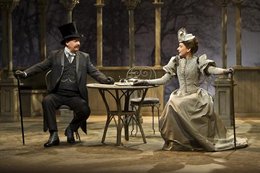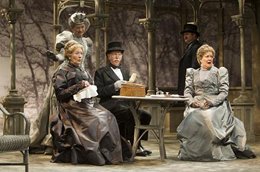Oscar Wilde had not yet truly hit his stride as a master of form and pace by the time A Woman of No Importance was first staged in 1893. It is classic Wilde in many respects: a comic melodrama populated by a combination of stuffy society types and devil-may-care Wildean stand-ins whose quips and paradoxical epigrams cut through the delusions and hypocrisies of their milieu. Specifically, here Wilde presents us with the company of Lady Hunstanton (Marion O’Dwyer), including archetypal dame Lady Caroline Pontefract (Deirdre Donnelly) with long-suffering husband accessory (Tom Hickey), snake-eyed sniper Mrs. Allonby (Cathy Belton) and hanger-on Lady Stutfield (Aoibheann O’Hara), bulstering political wannabe Mr. Kelvil (Michael James Ford), doddery Arch Deacon Daubeny (Des Keogh), and visiting American Miss Worsley (Aoibhín Garrihy), the latter by turns intrigued and appalled by the cavalier immorality by which British society lives. As if to clinch the deal we have wicked, world-weary Lord Illingworth (Stephen Brennan), who has just engaged the services of young Gerald Arbuthnot (James Murphy) as his private secretary. The plot thickens, or more accurately it actually begins, when the boy’s mother, Mrs. Arbuthnot (Ingrid Cragie) arrives at the party, revealing a past connection with Lord Illingworth that presents a social and moral challenge to the status quo.
visiting American Miss Worsley (Aoibhín Garrihy), the latter by turns intrigued and appalled by the cavalier immorality by which British society lives. As if to clinch the deal we have wicked, world-weary Lord Illingworth (Stephen Brennan), who has just engaged the services of young Gerald Arbuthnot (James Murphy) as his private secretary. The plot thickens, or more accurately it actually begins, when the boy’s mother, Mrs. Arbuthnot (Ingrid Cragie) arrives at the party, revealing a past connection with Lord Illingworth that presents a social and moral challenge to the status quo.
The play delves in to a well of battle-of-the-sexes material, which overlays a deeper current of socio-political satire that even extends to a degree of baiting of national pride through the American girl, whose high-minded ideals may be as informed by Wilde’s experiences in the United States in the 1880s as the central male relationships may have been influenced by his burgeoning relationship with Lord Alfred Douglas. Regardless, Wilde was perceptive and skilled, and on a good day was the writer we all think him to be, capable of moulding and transforming the contours of reality with sublime artifice. But there are many extended expositional scenes here where very little happens beyond transparent speechifying and where the quips and jibes aren’t quite as sharp as they would later become.
There are moving and dramatic moments too, but when they come they are also a little overextended, veering more deeply towards melodrama than the later, lighter, more ironic Wilde would (and we’re only talking about a matter of a very few years between this and its famous successors An Ideal Husband and The Importance of Being Earnest). This is the text, not the production. The production is very good. Director Patrick Mason handles the play with every bit as much respect as anyone could handle the sharper and more familiar pieces, and with the benefit of canny casting and smooth technical credits, delivers an engaging and entertaining variant on a familiar idiom.
 Eileen Diss’ almost monochromatic set, together with the sombre wrangling of the minor players during set changes establish a proper but not overly distracting sense of the moribund world in which the events transpire. Peter O’Brien’s costumes complete the look with a palette of barely distinguishable greys worn by men and women alike, the notable exceptions being Craigie’s widow-like blacks and Garrihy’s ivory. Paul Keogan’s lights enhance the effect of a grey world in desperate need of colour. The cast bring that colour with their precisely judged and often very funny vocalisations, from O’Hara’s salacious squeaking through Belton’s deep, icy invitations to sin to O’Dywer’s relentlessly cheerful babbling. It’s almost a radio play in the degree to which the voices have been modulated here, and this works very well. One could ask some questions about physical age in the central casting of Brennan and Craigie, but there is no question of their capacity to render these characters. Craigie is a model of understandable anxiety, playing both determination and vulnerability as if poised on the brink of snapping. Brennan brings some subtlety to a character at once odious and admirable (in context), and when asked to see him as human rather than just a vessel for one-liners, the audience will not find itself lost. Keogh almost steals the show in his one short bit as the Arch Deacon, though the ever-reliable Hickey is also a quiet joy as he mimes his character’s repeated attempts to escape the Terminator-like gaze of the formidable Lady Caroline, played with spiteful hauteur by Donnelly in the best tradition of a Lady Bracknell.
Eileen Diss’ almost monochromatic set, together with the sombre wrangling of the minor players during set changes establish a proper but not overly distracting sense of the moribund world in which the events transpire. Peter O’Brien’s costumes complete the look with a palette of barely distinguishable greys worn by men and women alike, the notable exceptions being Craigie’s widow-like blacks and Garrihy’s ivory. Paul Keogan’s lights enhance the effect of a grey world in desperate need of colour. The cast bring that colour with their precisely judged and often very funny vocalisations, from O’Hara’s salacious squeaking through Belton’s deep, icy invitations to sin to O’Dywer’s relentlessly cheerful babbling. It’s almost a radio play in the degree to which the voices have been modulated here, and this works very well. One could ask some questions about physical age in the central casting of Brennan and Craigie, but there is no question of their capacity to render these characters. Craigie is a model of understandable anxiety, playing both determination and vulnerability as if poised on the brink of snapping. Brennan brings some subtlety to a character at once odious and admirable (in context), and when asked to see him as human rather than just a vessel for one-liners, the audience will not find itself lost. Keogh almost steals the show in his one short bit as the Arch Deacon, though the ever-reliable Hickey is also a quiet joy as he mimes his character’s repeated attempts to escape the Terminator-like gaze of the formidable Lady Caroline, played with spiteful hauteur by Donnelly in the best tradition of a Lady Bracknell.
Dr. Harvey O'Brien is a writer and critic, and lectures in Film Studies at University College Dublin. His latest book, Action Movies: The Cinema of Striking Back, will be published Sept 2012.